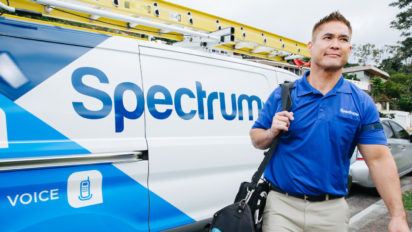Spectrum Internet® plans and pricing
Spectrum has three simple internet plans and is one of the largest cable internet providers in the U.S. Spectrum also offers free self-installation and bundling options, plus no data caps or contracts.
-
Spectrum Internet prices – Up to 300 Mbps* starting at:
$49.99/mo. for 12 mos* with Auto Pay
Limited time offer; subject to change; new residential customers only (no Spectrum services within past 30 days) and in good standing with Charter. Taxes and fees extra in select states. SPECTRUM INTERNET: Standard rates apply after promo period. Advertised price reflects $5 discount when enrolling in Auto Pay. Additional charge for installation. Speeds based on wired connection. Actual speeds (including wireless) vary and are not guaranteed. Gig capable modem required for Gig speed. For a list of Gig capable modems, visit Spectrum.net/modem. Services subject to all applicable service terms and conditions, subject to change. Not available in all areas. Restrictions apply. ©2024 Charter Communications. 07/11/24
Check with Spectrumor call to order: (844) 451-2720 (844) 451-2720

Related pages
-
Featured
![All about Spectrum services: Your ultimate guide]() All about Spectrum services: Your ultimate guide Robin Layton — 6 min read
All about Spectrum services: Your ultimate guide Robin Layton — 6 min read -
Featured
![Report: Internet users are gobbling data by more than a half-terabyte]() Report: Internet users are gobbling data by more than a half-terabyte Robin Layton — 4 min read
Report: Internet users are gobbling data by more than a half-terabyte Robin Layton — 4 min read -
Featured
![Spectrum’s new cancellation policy explained]() Spectrum’s new cancellation policy explained Taylor Gadsden — 2 min read
Spectrum’s new cancellation policy explained Taylor Gadsden — 2 min read
Latest
-
Thursday, July 25, 2024
Worried about losing your signal? This is how to keep your satellite dish cleanDavid Anders — 6 min read
-
Tuesday, July 23, 2024
The best free TV and movie streaming services 2024Camryn Smith — 5 min read
-
Tuesday, July 23, 2024
Everything you need to know about internet speedsRobin Layton — 8 min read

Subscribe to our weekly newsletter for internet news and promos
By subscribing, you agree to receive Allconnect newsletter and promotional emails. Your privacy is important to us.






